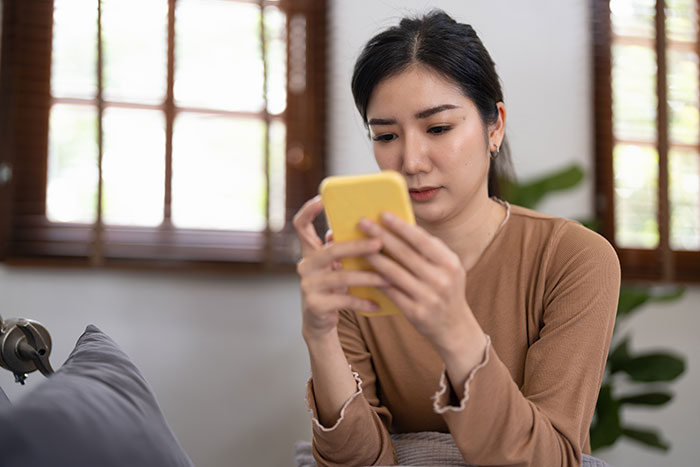Mumsnet user PollyJH thought she had a pretty good idea of who her partner was as a person, but after recent drama within their circle, she’s no longer so sure.
It all started when one of her friends began suspecting her own husband of being unfaithful, and she chose to secretly go through his phone in an attempt to find out if that was really the case.
During the process, she discovered a group chat that PollyJH’s significant other was also a part of and decided to forward her some of the messages because they were… quite something.
This woman inadvertently found out that her partner hates her friends

Image credits: seleznev_photos (not the actual photo)
And she’s appalled by the words he used to describe them






Image credits: Prostock-studio (not the actual photo)





Image credits: PollyJH
Some people just can’t resist the urge to snoop on their partners
Data collected by YouGov shows that nearly one in five (19%) Americans have gone through a romantic partner’s phone without permission.
Therapist Kurt Smith said, “When people sneak a peek at their partner’s phone, it feeds secrecy and distrust into the relationship, both of which are likely to be the primary reasons the person is checking in the first place. So while this may seem in the moment as a good idea and justified, it only creates more of the problems that need to be resolved.”
However, most of those who poked around (73%) don’t regret it. One possible reason for this is that snooping — similar to our particular case — often turns up results.
A third of snoopers (33%) say they found evidence of something they’d already suspected, while 18% discovered something they hadn’t previously even thought of.

Image credits: nateemee (not the actual photo)
Millennial women are the most likely snoopers: one-third (33%) admit to having looked through their partner’s phone without permission, while only 23% of their Millennial male counterparts say the same.
For those who are compelled to do so, Smith recommends taking a hard look at what’s driving their desire.
“Ask yourself: what am I trying to accomplish? Does this approach really improve things? How can I do this in a way that would build trust rather than create distrust?” he said.
Once it’s done, there are multiple routes people can take. I assume we can all agree that, for example, if you learned that your partner had committed a hideous crime, you’d have to do something about it, which means there is a line after which a response is warranted. Whether or not she’s there, the author of the post will have to decide for herself.
In general, almost half (49%) of Americans believe that couples should have access to one another’s phones, but that access should be somewhat limited.
Three in ten (28%) think that partners should have unlimited access to one another’s phones and one in ten (9%) say that romantic partners should not have any access to each other’s phones at all.

Image credits: YuriArcursPeopleimages (not the actual photo)
People who read the story have had a lot of different reactions, and some also shared their suggestions for how the woman can navigate the situation


























 English (US) ·
English (US) ·